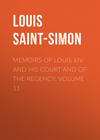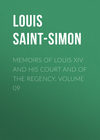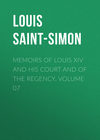Loe raamatut: «Memoirs of Louis XIV and His Court and of the Regency. Complete», lehekülg 42
While thus all was tranquillity at Versailles, and even at Meudon, everything had changed its aspect at the chateau. The King had seen Monseigneur several times during the day; but in his after-dinner visit he was so much struck with the extraordinary swelling of the face and of the head, that he shortened his stay, and on leaving the chateau, shed tears. He was reassured as much as possible, and after the council he took a walk in the garden.
Nevertheless Monseigneur had already mistaken Madame la Princesse de Conti for some one else; and Boudin, the doctor, was alarmed. Monseigneur himself had been so from the first, and he admitted, that for a long time before being attacked, he had been very unwell, and so much on Good Friday, that he had been unable to read his prayer-book at chapel.
Towards four o’clock he grew worse, so much so that Boudin proposed to Fagon to call in other doctors, more familiar with the disease than they were. But Fagon flew into a rage at this, and would call in nobody. He declared that it would be better to act for themselves, and to keep Monseigneur’s state secret, although it was hourly growing worse, and towards seven o’clock was perceived by several valets and courtiers. But nobody dared to open his mouth before Fagon, and the King was actually allowed to go to supper and to finish it without interruption, believing on the faith of Fagon that Monseigneur was going on well.
While the King supped thus tranquilly, all those who were in the sick- chamber began to lose their wits. Fagon and the others poured down physic on physic, without leaving time for any to work. The Cure, who was accustomed to go and learn the news every evening, found, against all custom, the doors thrown wide open, and the valets in confusion. He entered the chamber, and perceiving what was the matter, ran to the bedside, took the hand of Monseigneur, spoke to him of God, and seeing him full of consciousness, but scarcely able to speak, drew from him a sort of confession, of which nobody had hitherto thought, and suggested some acts of contrition. The poor Prince repeated distinctly several words suggested to him, and confusedly answered others, struck his breast, squeezed the Cure’s hand, appeared penetrated with the best sentiments, and received with a contrite and willing air the absolution of the Cure.
As the King rose from the supper-table, he well-nigh fell backward when Fagon, coming forward, cried in great trouble that all was lost. It may be imagined what terror seized all the company at this abrupt passage from perfect security to hopeless despair. The King, scarcely master of himself, at once began to go towards the apartment of Monseigneur, and repelled very stiffly the indiscreet eagerness of some courtiers who wished to prevent him, saying that he would see his son again, and be quite certain that nothing could be done. As he was about to enter the chamber, Madame la Princesse de Conti presented herself before him, and prevented him from going in. She pushed him back with her hands, and said that henceforth he had only to think of himself. Then the King, nearly fainting from a shock so complete and so sudden, fell upon a sofa that stood near. He asked unceasingly for news of all who passed, but scarce anybody dared to reply to him. He had sent for here Tellier, who went into Monseigneur’s room; but it was no longer time. It is true the Jesuit, perhaps to console the King, said that he gave him a well-founded absolution. Madame de Maintenon hastened after the King, and sitting down beside him on the same sofa, tried to cry. She endeavoured to lead away the King into the carriage already waiting for him in the courtyard, but he would not go, and sat thus outside the door until Monseigneur had expired.
The agony, without consciousness, of Monseigneur lasted more than an hour after the King had come into the cabinet. Madame la Duchesse and Madame la Princesse de Conti divided their cares between the dying man and the King, to whom they constantly came back; whilst the faculty confounded, the valets bewildered, the courtiers hurrying and murmuring, hustled against each other, and moved unceasingly to and fro, backwards and forwards, in the same narrow space. At last the fatal moment arrived. Fagon came out, and allowed so much to be understood.
The King, much afflicted, and very grieved that Monseigneur’s confession had been so tardily made, abused Fagon a little; and went away led by Madame de Maintenon and the two Princesses. He was somewhat struck by finding the vehicle of Monseigneur outside; and made a sign that he would have another coach, for that one made him suffer, and left the chateau. He was not, however, so much occupied with his grief that he could not call Pontchartrain to arrange the hour of the council on the next day. I will not comment on this coolness, and shall merely say it surprised extremely all present; and that if Pontchartrain had not said the council could be put off, no interruption to business would have taken place. The King got into his coach with difficulty, supported on both sides. Madame de Maintenon seated herself beside him. A crowd of officers of Monseigneur lined both sides of the court on their knees, as he passed out, crying to him with strange howlings to have compassion on them, for they had lost all, and must die of hunger.
CHAPTER LVII
While Meudon was filled with horror, all was tranquil at Versailles, without the least suspicion. We had supped. The company some time after had retired, and I was talking with Madame de Saint-Simon, who had nearly finished undressing herself to go to bed, when a servant of Madame la Duchesse de Berry, who had formerly belonged to us, entered, all terrified. He said that there must be some bad news from Meudon, since Monseigneur le Duc de Bourgogne had just whispered in the ear of M. le Duc de Berry, whose eyes had at once become red, that he left the table, and that all the company shortly after him rose with precipitation. So sudden a change rendered my surprise extreme. I ran in hot haste to Madame la Duchesse de Berry’s. Nobody was there. Everybody had gone to Madame la Duchesse de Bourgogne. I followed on with all speed.
I found all Versailles assembled on arriving, all the ladies hastily dressed—the majority having been on the point of going to bed—all the doors open, and all in trouble. I learnt that Monseigneur had received the extreme unction, that he was without consciousness and beyond hope, and that the King had sent word to Madame de Bourgogne that he was going to Marly, and that she was to meet him as he passed through the avenue between the two stables.
The spectacle before me attracted all the attention I could bestow. The two Princes and the two Princesses were in the little cabinet behind the bed.
The bed toilette was as usual in the chamber of the Duchesse de Bourgogne, which was filled with all the Court in confusion. She came and went from the cabinet to the chamber, waiting for the moment when she was to meet the King; and her demeanour, always distinguished by the same graces, was one of trouble and compassion, which the trouble and compassion of others induced them to take for grief. Now and then, in passing, she said a few rare words. All present were in truth expressive personages. Whoever had eyes, without any knowledge of the Court, could see the interests of all interested painted on their faces, and the indifference of the indifferent; these tranquil, the former penetrated with grief, or gravely attentive to themselves to, hide their emancipation and their joy.
For my part, my first care was to inform myself thoroughly of the state of affairs, fearing lest there might be too much alarm for too trifling a cause; then, recovering myself, I reflected upon the misery common to all men, and that I myself should find myself some day at the gates of death. Joy, nevertheless, found its way through the momentary reflections of religion and of humanity, by which I tried to master myself. My own private deliverance seemed so great and so unhoped for, that it appeared to me that the State must gain everything by such a loss. And with these thoughts I felt, in spite of myself, a lingering fear lest the sick man should recover, and was extremely ashamed of it.
Wrapped up thus in myself, I did not fail, nevertheless, to cast clandestine looks upon each face, to see what was passing there. I saw Madame la Duchesse d’Orleans arrive, but her countenance, majestic and constrained, said nothing. She went into the little cabinet, whence she presently issued with the Duc d’Orleans, whose activity and turbulent air marked his emotion at the spectacle more than any other sentiment. They went away, and I notice this expressly, on account of what happened afterwards in my presence.
Soon afterwards I caught a distant glimpse of the Duc de Bourgogne, who seemed much moved and troubled; but the glance with which I probed him rapidly, revealed nothing tender, and told merely of a mind profoundly occupied with the bearings of what had taken place.
Valets and chamber-women were already indiscreetly crying out; and their grief showed well that they were about to lose something!
Towards half-past twelve we had news of the King, and immediately after Madame de Bourgogne came out of the little cabinet with the Duke, who seemed more touched than when I first saw him. The Princess took her scarf and her coifs from the toilette, standing with a deliberate air, her eyes scarcely wet—a fact betrayed by inquisitive glances cast rapidly to the right and left—and, followed only by her ladies, went to her coach by the great staircase.
I took the opportunity to go to the Duchesse d’Orleans, where I found many people. Their presence made me very impatient; the Duchess, who was equally impatient, took a light and went in. I whispered in the ear of the Duchesse de Villeroy, who thought as I thought of this event. She nudged me, and said in a very low voice that I must contain myself. I was smothered with silence, amidst the complaints and the narrative surprises of these ladies; but at last M. le Duc d’Orleans appeared at the door of his cabinet, and beckoned me to come to him.
I followed him into the cabinet, where we were alone. What was my surprise, remembering the terms on which he was with Monseigneur, to see the tears streaming from his eyes.
“Sir!” exclaimed I, rising: He understood me at once; and answered in a broken voice, really crying: “You are right to be surprised—I am surprised myself; but such a spectacle touches. He was a man with whom I passed much of my life, and who treated me well when he was uninfluenced. I feel very well that my grief won’t last long; in a few days I shall discover motives of joy; at present, blood, relationship, humanity,—all work; and my entrails are moved.” I praised his sentiments, but repeated my surprise. He rose, thrust his head into a corner, and with his nose there, wept bitterly and sobbed, which if I had not seen I could not have believed.
After a little silence, however, I exhorted him to calm himself. I represented to him that, everybody knowing on what terms he had been with Monseigneur, he would be laughed at, as playing a part, if his eyes showed that he had been weeping. He did what he could to remove the marks of his tears, and we then went back into the other room.
The interview of the Duchesse de Bourgogne with the King had not been long. She met him in the avenue between the two stables, got down, and went to the door of the carriage. Madame de Maintenon cried out, “Where are you going? We bear the plague about with us.” I do not know what the King said or did. The Princess returned to her carriage, and came back to Versailles, bringing in reality the first news of the actual death of Monseigneur.
Acting upon the advice of M. de Beauvilliers, all the company had gone into the salon. The two Princes, Monseigneur de Bourgogne and M. de Berry, were there, seated on one sofa, their Princesses at their sides; all the rest of the company were scattered about in confusion, seated or standing, some of the ladies being on the floor, near the sofa. There could be no doubt of what had happened. It was plainly written on every face in the chamber and throughout the apartment. Monseigneur was no more: it was known: it was spoken of: constraint with respect to him no longer existed. Amidst the surprise, the confusion, and the movements that prevailed, the sentiments of all were painted to the life in looks and gestures.
In the outside rooms were heard the constrained groans and sighs of the valets—grieving for the master they had lost as well as for the master that had succeeded. Farther on began the crowd of courtiers of all kinds. The greater number—that is to say the fools—pumped up sighs as well as they could, and with wandering but dry eyes, sung the praises of Monseigneur—insisting especially on his goodness. They pitied the King for the loss of so good a son. The keener began already to be uneasy about the health of the King; and admired themselves for preserving so much judgment amidst so much trouble, which could be perceived by the frequency of their repetitions. Others, really afflicted—the discomfited cabal—wept bitterly, and kept themselves under with an effort as easy to notice as sobs. The most strong-minded or the wisest, with eyes fixed on the ground, in corners, meditated on the consequences of such an event—and especially on their own interests. Few words passed in conversation—here and there an exclamation wrung from grief was answered by some neighbouring grief—a word every quarter of an hour —sombre and haggard eyes—movements quite involuntary of the hands— immobility of all other parts of the body. Those who already looked upon the event as favourable in vain exaggerated their gravity so as to make it resemble chagrin and severity; the veil over their faces was transparent and hid not a single feature. They remained as motionless as those who grieved most, fearing opinion, curiosity, their own satisfaction, their every movement; but their eyes made up for their immobility. Indeed they could not refrain from repeatedly changing their attitude like people ill at ease, sitting or standing, from avoiding each other too carefully, even from allowing their eyes to meet—nor repress a manifest air of liberty—nor conceal their increased liveliness—nor put out a sort of brilliancy which distinguished them in spite of themselves.
The two Princes, and the two Princesses who sat by their sides, were more exposed to view than any other. The Duc de Bourgogne wept with tenderness, sincerity, and gentleness, the tears of nature, of religion, and patience. M. le Duc de Berry also sincerely shed abundance of tears, but bloody tears, so to speak, so great appeared their bitterness; and he uttered not only sobs, but cries, nay, even yells. He was silent sometimes, but from suffocation, and then would burst out again with such a noise, such a trumpet sound of despair, that the majority present burst out also at these dolorous repetitions, either impelled by affliction or decorum. He became so bad, in fact, that his people were forced to undress him then and there, put him to bed, and call in the doctor, Madame la Duchesse de Berry was beside herself, and we shall soon see why. The most bitter despair was painted with horror on her face. There was seen written, as it were, a sort of furious grief, based on interest, not affection; now and then came dry lulls deep and sullen, then a torrent of tears and involuntary gestures, yet restrained, which showed extreme bitterness of mind, fruit of the profound meditation that had preceded. Often aroused by the cries of her husband, prompt to assist him, to support him, to embrace him, to give her smelling-bottle, her care for him was evident; but soon came another profound reverie—then a gush of tears assisted to suppress her cries. As for Madame la Duchesse de Bourgogne she consoled her husband with less trouble than she had to appear herself in want of consolation. Without attempting to play a part, it was evident that she did her best to acquit herself of a pressing duty of decorum. But she found extreme difficulty in keeping up appearances. When the Prince her brother-in-law howled, she blew her nose. She had brought some tears along with her and kept them up with care; and these, combined with the art of the handkerchief, enabled her to redden her eyes, and make them swell, and smudge her face; but her glances often wandered on the sly to the countenances of all present.
Madame arrived, in full dress she knew not why, and howling she knew not why, inundated everybody with her tears in embracing them, making the chateau echo with renewed cries, and furnished the odd spectacle of a Princess putting on her robes of ceremony in the dead of night to come and cry among a crowd of women with but little on except their night- dresses,—almost as masqueraders.
In the gallery several ladies, Madame la Duchesse d’Orleans, Madame de Castries, and Madame de Saint-Simon among the rest, finding no one close by, drew near each other by the side of a tent-bedstead, and began to open their hearts to each other, which they did with the more freedom, inasmuch as they had but one sentiment in common upon what had occurred. In this gallery, and in the salon, there were always during the night several beds, in which, for security’s sake, certain Swiss guards and servants slept. These beds had been put in their usual place this evening before the bad news came from Meudon. In the midst of the conversation of the ladies, Madame de Castries touched the bed, felt something move, and was much terrified. A moment after they saw a sturdy arm, nearly naked, raise on a sudden the curtains, and thus show them a great brawny Swiss under the sheets, half awake, and wholly amazed. The fellow was a long time in making out his position, fixing his eyes upon every face one after the other; but at last, not judging it advisable to get up in the midst of such a grand company, he reburied himself in his bed, and closed the curtains. Apparently the good man had gone to bed before anything had transpired, and had slept so soundly ever since that he had not been aroused until then. The saddest sights have often the most ridiculous contrasts. This caused some of the ladies to laugh, and Madame d’Orleans to fear lest the conversation should have been overheard. But after reflection, the sleep and the stupidity of the sleeper reassured her.
I had some doubts yet as to the event that had taken place; for I did not like to abandon myself to belief, until the word was pronounced by some one in whom I could have faith. By chance I met D’O, and I asked him. He answered me clearly that Monseigneur was no more. Thus answered, I tried not to be glad. I know not if I succeeded well, but at least it is certain, that neither joy nor sorrow blunted my curiosity, and that while taking due care to preserve all decorum, I did not consider myself in any way forced to play the doleful. I no longer feared any fresh attack from the citadel of Meudon, nor any cruel charges from its implacable garrison. I felt, therefore, under no constraint, and followed every face with my glances, and tried to scrutinise them unobserved.
It must be admitted, that for him who is well acquainted with the privacies of a Court, the first sight of rare events of this nature, so interesting in so many different respects, is extremely satisfactory. Every countenance recalls the cares, the intrigues, the labours employed in the advancement of fortunes—in the overthrow of rivals: the relations, the coldness, the hatreds, the evil offices done, the baseness of all; hope, despair, rage, satisfaction, express themselves in the features. See how all eyes wander to and fro examining what passes around—how some are astonished to find others more mean, or less mean than was expected! Thus this spectacle produced a pleasure, which, hollow as it may be, is one of the greatest a Court can bestow.
The turmoil in this vast apartment lasted about an hour, at the end of which M. de Beauvilliers thought it was high time to deliver the Princes of their company. The rooms were cleared. M. le Duc de Berry went away to his rooms, partly supported by his wife. All through the night he asked, amid tears and cries, for news from Meudon; he would not understand the cause of the King’s departure to Marly. When at length the mournful curtain was drawn from before his eyes, the state he fell into cannot be described. The night of Monseigneur and Madame de Bourgogne was more tranquil. Some one having said to the Princess, that having—no real cause to be affected, it would be terrible to play a part, she replied, quite naturally, that without feigning, pity touched her and decorum controlled her; and indeed she kept herself within these bounds with truth and decency. Their chamber, in which they invited several ladies to pass the night in armchairs, became immediately a palace of Morpheus. All quietly fell asleep. The curtains were left open, so that the Prince and Princess could be seen sleeping profoundly. They woke up once or twice for a moment. In the morning the Duke and Duchess rose early, their tears quite dried up. They shed no more for this cause, except on special and rare occasions. The ladies who had watched and slept in their chamber, told their friends how tranquil the night had been. But nobody was surprised, and as there was no longer a Monseigneur, nobody was scandalised. Madame de Saint-Simon and I remained up two hours before going to bed, and then went there without feeling any want of rest. In fact, I slept so little that at seven in the morning I was up; but it must be admitted that such restlessness is sweet, and such re-awakenings are savoury.
Horror reigned at Meudon. As soon as the King left, all the courtiers left also, crowding into the first carriages that came. In an instant Meudon was empty. Mademoiselle Choin remained alone in her garret, and unaware of what had taken place. She learned it only by the cry raised. Nobody thought of telling her. At last some friends went up to her, hurried her into a hired coach, and took her to Paris. The dispersion was general. One or two valets, at the most, remained near the body. La Villiere, to his praise be it said, was the only courtier who, not having abandoned Monseigneur during life, did not abandon him after his death. He had some difficulty to find somebody to go in search of Capuchins to pray over the corpse. The decomposition became so rapid and so great, that the opening of the windows was not enough; the Capuchins, La Vrilliere, and the valets, were compelled to pass the night outside.
At Marly everybody had felt so confident that the King’s return there was not dreamt of. Nothing was ready, no keys of the rooms, no fires, scarcely an end of candle. The King was more than an hour thus with Madame de Maintenon and other ladies in one of the ante-chambers. The King retired into a corner, seated between Madame de Maintenon and two other ladies, and wept at long intervals. At last the chamber of Madame de Maintenon was ready. The King entered, remained there an hour, and then ‘went to bed at nearly four o’clock in the morning.
Monseigneur was rather tall than short; very fat, but without being bloated; with a very lofty and noble aspect without any harshness; and he would have had a very agreeable face if M. le Prince de Conti had not unfortunately broken his nose in playing while they were both young. He was of a very beautiful fair complexion; he had a face everywhere covered with a healthy red, but without expression; the most beautiful legs in the world; his feet singularly small and delicate. He wavered always in walking, and felt his way with his feet; he was always afraid of falling, and if the path was not perfectly even and straight, he called for assistance. He was a good horseman, and looked well when mounted; but he was not a bold rider. When hunting—they had persuaded him that he liked this amusement—a servant rode before him; if he lost sight of this servant he gave himself up for lost, slicked his pace to a gentle trot, and oftentimes waited under a tree for the hunting party, and returned to it slowly. He was very fond of the table, but always without indecency. Ever since that great attack of indigestion, which was taken at first for apoplexy, he made but one real meal a day, and was content,—although a great eater, like the rest of the royal family. Nearly all his portraits well resemble him.
As for his character he had none; he was without enlightenment or knowledge of any kind, radically incapable of acquiring any; very idle, without imagination or productiveness; without taste, without choice, without discernment; neither seeing the weariness he caused others, nor that he was as a ball moving at hap-hazard by the impulsion of others; obstinate and little to excess in everything; amazingly credulous and accessible to prejudice, keeping himself, always, in the most pernicious hands, yet incapable of seeing his position or of changing it; absorbed in his fat and his ignorance; so that without any desire to do ill he would have made a pernicious King.
His avariciousness, except in certain things, passed all belief. He kept an account of his personal expenditure, and knew to a penny what his smallest and his largest expenses amounted to. He spent large sums in building, in furniture, in jewels, and in hunting, which he made himself believe he was fond of.
It is inconceivable the little he gave to La Choin, whom he so much loved. It never exceeded four hundred Louis a quarter in gold, or sixteen hundred Louis a year, whatever the Louis might be worth. He gave them to her with his own hand, without adding or subtracting a pistole, and, at the most, made her but one present a year, and that he looked at twice before giving. It was said that they were married, and certain circumstances seemed to justify this rumour. As for instance, during the illness of Monseigneur, the King, as I have said, asked Madame de Maintenon if she had seen Mademoiselle Choin, and upon receiving negative reply, was displeased. Instead of driving her away from the chateau he inquired particularly after her! This, to say the least, looked as though Mademoiselle Choin was Monseigneur’s Maintenon—but the matter remained incomprehensible to the last. Mademoiselle Choin threw no light upon it, although she spoke on many other things concerning Monseigneur. In the modest home at Paris, to which she had retired for the rest of her days. The King gave her a pension of twelve thousand livres.
Monseigneur was, I have said, ignorant to the last degree, and had a thorough aversion for learning; so that, according to his own admission, ever since he had been released from the hands of teachers he had never read anything except the article in the “Gazette de France,” in which deaths and marriages are recorded. His timidity, especially before the King, was equal to his ignorance, which indeed contributed not a little to cause it. The King took advantage of it, and never treated him as a son, but as a subject. He was the monarch always, never the father. Monseigneur had not the slightest influence with the King. If he showed any preference for a person it was enough! That person was sure to be kept back by the King. The King was so anxious to show that Monseigneur could do nothing, that Monseigneur after a time did not even try. He contented himself by complaining occasionally in monosyllables, and by hoping for better times.
The body of Monseigneur so soon grew decomposed; that immediate burial was necessary. At midnight on Wednesday he was carried, with but little ceremony, to Saint-Denis, and deposited in the royal vaults. His funeral services were said at Saint-Denis on the 18th of the following June, and at Notre Dame on the 3rd of July. As the procession passed through Paris nothing but cries, acclamations, and eulogiums of the defunct were heard. Monseigneur had, I know not how, much endeared himself to the common people of Paris, and this sentiment soon gained the provinces; so true it is, that in France it costs little to its Princes to make themselves almost adored!
The King soon got over his affliction for the loss of this son of fifty. Never was a man so ready with tears, so backward with grief, or so promptly restored to his ordinary state. The morning after the death of Monseigneur he rose late, called M. de Beauvilliers into his cabinet, shed some more tears, and then said that from that time Monseigneur le Duc de Bourgogne and Madame la Duchesse de Bourgogne were to enjoy the honours, the rank, and the name of Dauphin and of Dauphine. Henceforth I shall call them by no other names.
My joy at this change may be imagined. In a few days all my causes of disquietude had been removed, and I saw a future opening before me full of light and promise. Monseigneur le Duc de Bourgogne become Dauphin, heir to the throne of France; what favour might I not hope for? I could not conceal or control my satisfaction.
But alas! it was soon followed by sad disappointment and grievous sorrow.



















